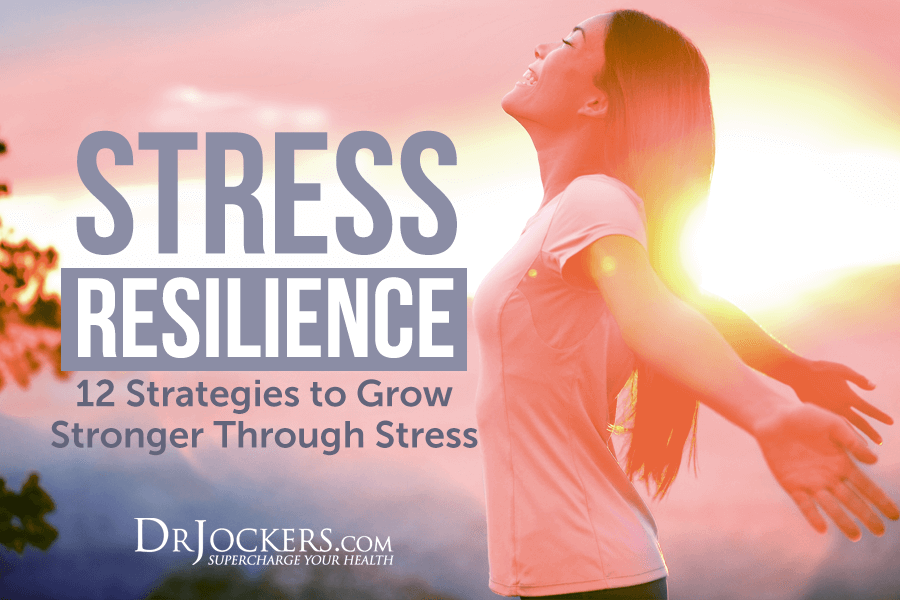 Stress Resilience: 12 Strategies to Grow Stronger Through Stress
Stress Resilience: 12 Strategies to Grow Stronger Through Stress
Everyone gets stressed from time to time. However, when you are in a constant state of stress, it can turn into a serious problem. Chronic stress can affect your entire body, including your respiratory, digestive, cardiovascular, musculoskeletal, nervous, reproductive, and endocrine systems.
It can impact your physical health, mental health, spiritual health, relationships, professional and social life, and other aspects of life. Improving your stress resilience is important for reducing stress and protecting your health.
In this article, you will learn what stress is. You will understand the long-term impact of chronic stress. You will understand the benefits of measuring your heart rate variability and the importance of stress resilience. I will share my top 12 strategies for stress resilience.

What Is Stress
Stress gets a bad reputation. However, stress is actually an important function of your body. It is your body’s natural defense mechanism against danger and predators. When something dangerous or bad happens or is about to you, stress prompts you to flood your body with hormones in order to escape from or fight the danger off. This mechanism is also referred to as the fight-or-flight mechanism.
According to the American Psychological Association, your autonomic nervous system (ANS), which is a part of your peripheral nervous system, plays an important and direct role in your stress response (1). Your ANS has two parts; the sympathetic nervous system (SNS) and the parasympathetic nervous system (PNS).
Under stress, your SNS is responsible for the flight-or-fight response. It prompts your body to protect itself by fighting or fleeing the threat. When this happens, the SNS sends a message to your adrenal glands to release cortisol and adrenaline.
These hormones will prompt your breathing to increase, your heart to beat faster, your blood vessels to dilate, and your digestion to slow to help your body fight or flee the danger. Once the danger is over, your body should be returned to a normal, unstressed, pre-emergency state. However, if you are experiencing chronic stress and chronic stressors, your body will be unable to return to a pre-danger, stress-free state, instead, it will remain in an ongoing state of fight-or-flight.
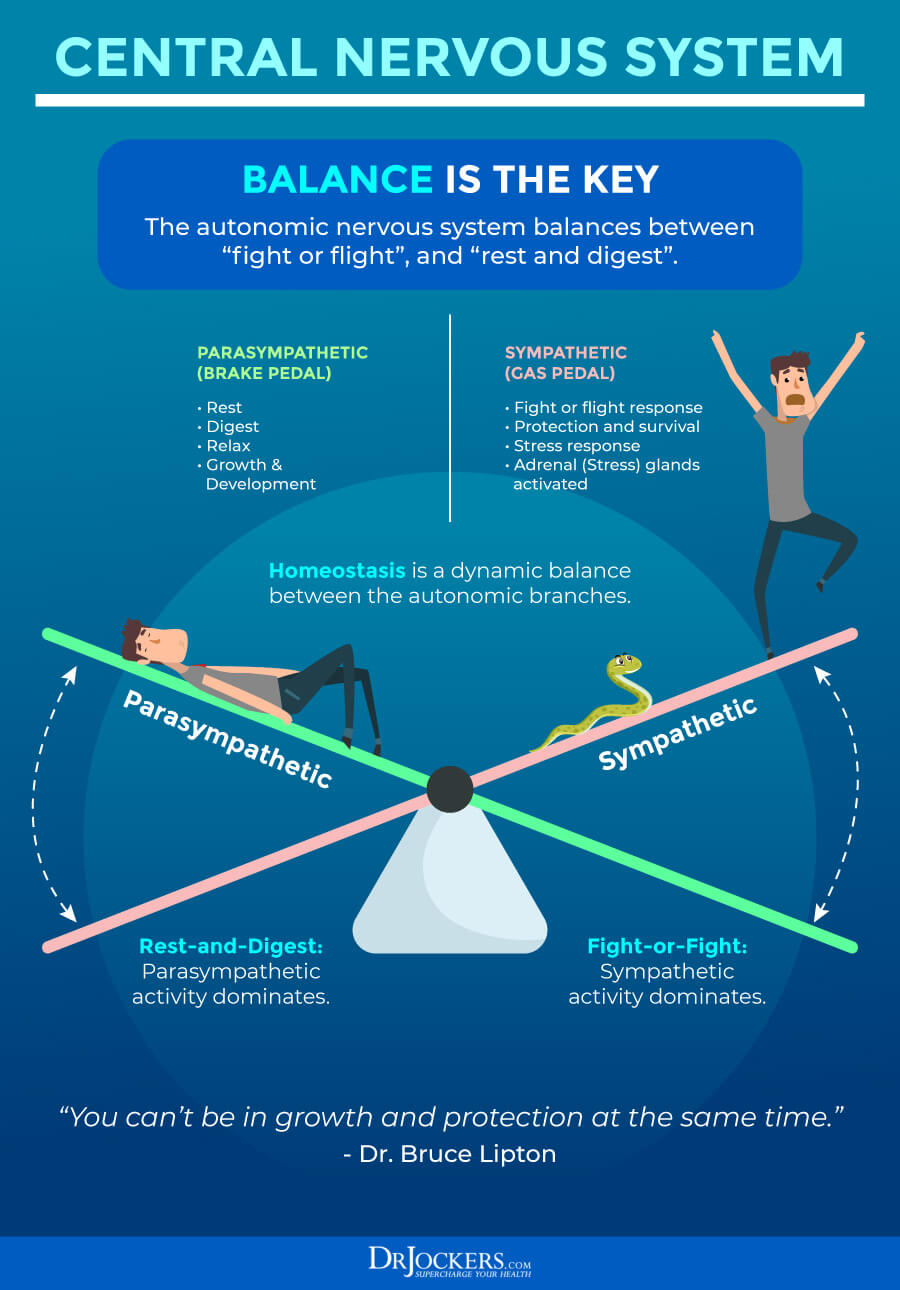
Acute vs Chronic Stress
According to the National Institute of Mental Health (NIMH), there are two types of stress: acute and chronic. Acute stress happens when there is a specific event that is causing stress (2).
For example, if there is a fire, you are in an accident, someone is about to mug you, or a dog is chasing you, you will experience acute stress. The stress response we just talked about is a wonderful mechanism in case of acute stress. It prompts you to respond and protect yourself.
However, when stress turns chronic it becomes a problem (3). Chronic stress develops over time. It doesn’t have one specific reason or trigger. If you are under chronic stress, your body is experiencing chronic stressors and chronic stress response over a prolonged period of time.
Traumatic life experiences (especially early in life), poverty or financial difficulties, dysfunctional family situations, chronic illness, job dissatisfaction, and other factors can all lead to chronic stress. Chronic stress means that you are most of the time or always under stress and your body is constantly experiencing fight-or-flight without an actual specific threat. Chronic stress can have serious consequences on your physical and mental health.
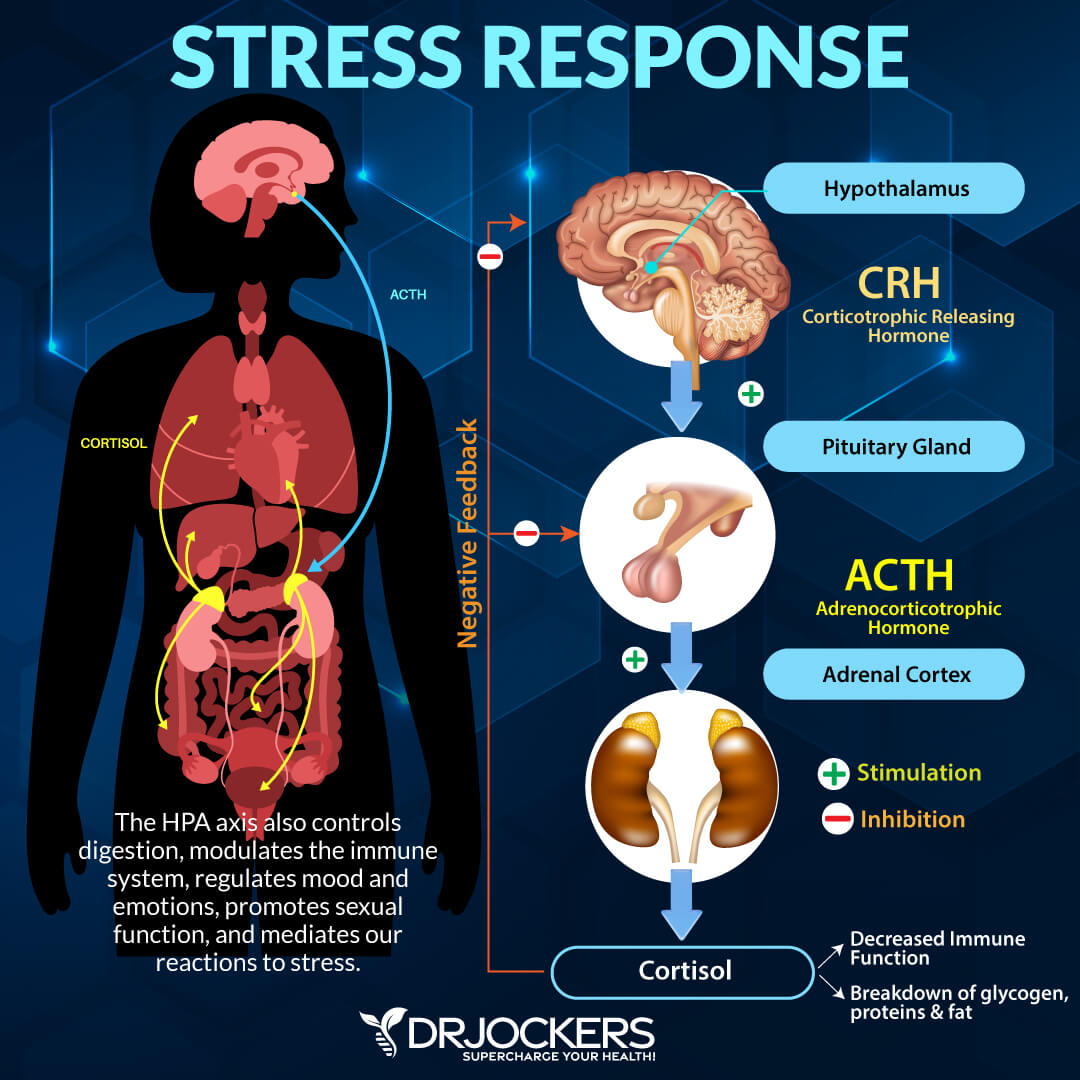
Long-Term Impact of Chronic Stress
Experiencing chronic stress and experiencing chronic stress response can have a serious impact on your body. According to a 2012 study published in the Annals of New York Academy of Sciences, chronic stress can increase inflammation and hypercortisolism, which often characterize stress-related illnesses, such as metabolic syndrome, cardiovascular disease, depression, osteoporosis, and glucocorticoid resistance (4). According to a 2016 mice study published in Nature Communications, chronic stress may contribute to the development of cancer (5).
According to the American Psychological Association, chronic stress can affect your entire body, including your respiratory, digestive, cardiovascular, musculoskeletal, nervous, reproductive, and endocrine systems (6). Chronic stress can impact your physical health, mental health, spiritual health, relationships, job satisfaction, financial health, joy in life, and other aspects of life.
Symptoms and long-term impact of chronic stress may include:
- Musculoskeletal pain and musculoskeletal disorders
- Headaches and migraines
- Fatigue and chronic fatigue issues
- Poor sleep, insomnia, and other sleep issues
- Anxiety, depression, panic attacks, and other mental health and mood issues
- Feelings of helplessness, hopelessness, loss of control, and low self-esteem
- Constipation, diarrhea, nausea, other digestion symptoms, and digestive disorders
- Changes in appetite, weight gain, or weight loss
- Respiratory symptoms, including shortness of breath, rapid breathing
- Cardiovascular problems, including high blood pressure and heart disease
- Compromised memory, brain fog, and cognitive issues
- Metabolic disease, high blood sugar, pre-diabetes, and diabetes
- Hormonal health issues, including low fertility, menstruation issues, erectile dysfunction, and low sex drive
- Pre-mature aging
- Compromised immunity and increased infections and illness
- Increased risk of cancer
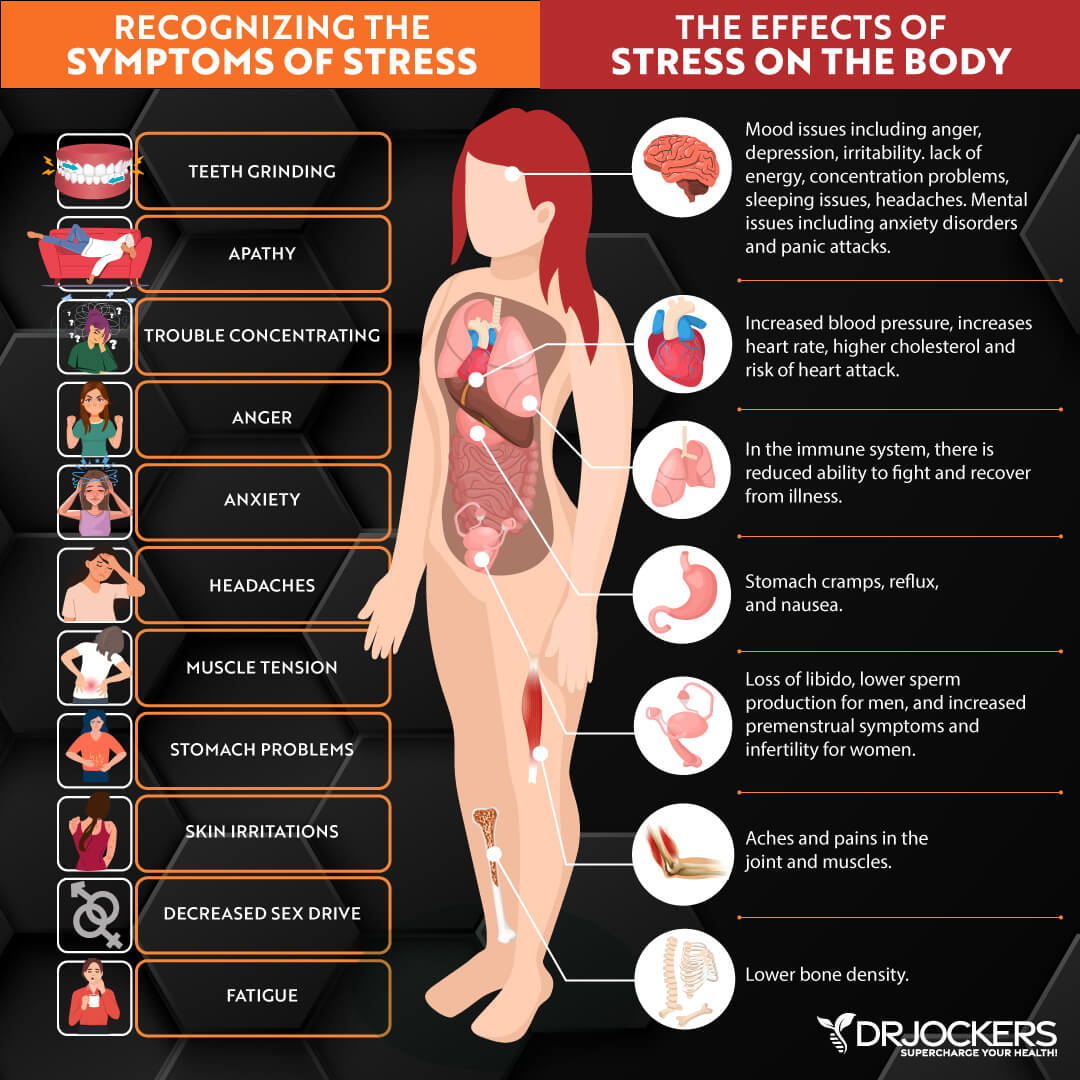
Measuring Your Response to Stress with HRV
Heart rate variability (HRV) is a measure of the variation of time between each of your heartbeats. Variations between your heartbeats are normal and they are controlled by your ANS. As you go through your day, your ANS sends signals to the rest of your body.
It leads to the stimulation or relaxation of different functions. For example, if you get exciting news, your ANS will send signals to prompt excitement, engagement, and joy. If you experience a negative interaction at work, it may send a stress response that may cause fear, anger, or sadness.
If you got a poor night’s sleep the night before, it would prompt fatigue. All this affects your heart rate.
As you’ve learned, if you are experiencing chronic stress and chronic triggers, such as dysfunctional relationships, job stress, isolation or loneliness, lack of exercise, poor sleep, or an unhealthy diet, your body will go into overdrive and stuck in fight-or-flight mode. This, of course, also affects your HRV, but in a negative way leading to imbalances.
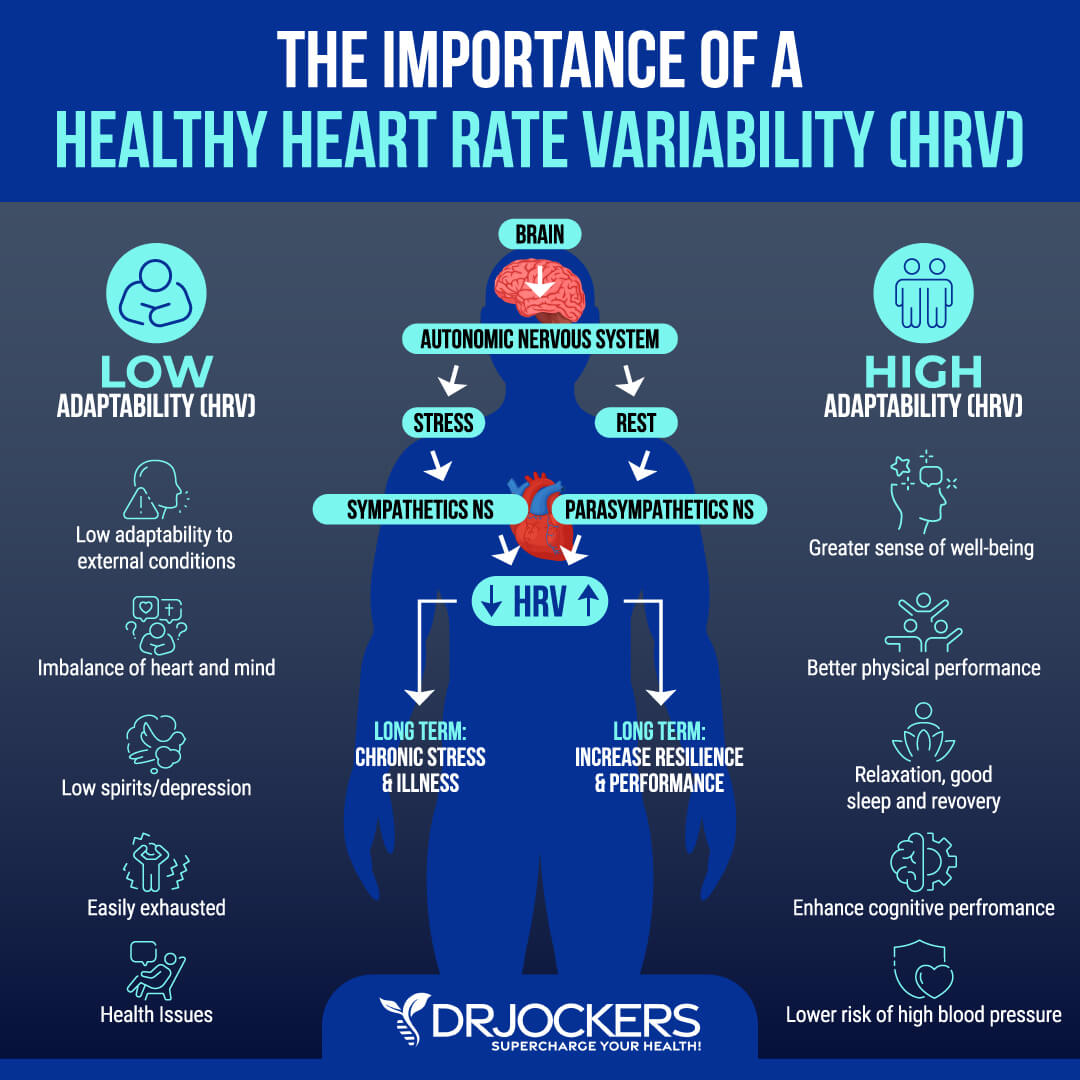
Measuring HRV
According to a 2018 meta-analysis and review published in Psychiatry Investigation, HRV may be a great indicator of psychological stress (7). Your HRV is a non-invasive and simple way to check for ANS imbalances. If you are in a constant fight-or-flight mode due to chronic stress, your HRV will be below.
In a healthier and more relaxed state, your HRV will be high. The healthier your ANS is, the faster it will be able to switch gears and relax after experiencing acute stress. High HRV may indicate more resilience to stress, better mental health, greater cardiovascular fitness, a healthier body, and a lower risk of mortality (8). A low HRV may be associated with depression, anxiety, and symptoms and risks of chronic stress.
Checking your HRV variability several times a week to look for patterns can be a helpful tool. A low HRV indicates that you need to improve your resiliency to stress to improve your mental and physical health. In the past, doctors your electrocardiograms to test your HRV, but today, you can buy heart rate monitors in conjunction with apps to get an idea of your HRV.
Tracking your HRV with a device, such as the Oura Ring can allow you to gain a better understanding of your body and your resilience to stress, sleep quality, and recovery each day. This is something my wife and I use daily to track our sleep and HRV levels.
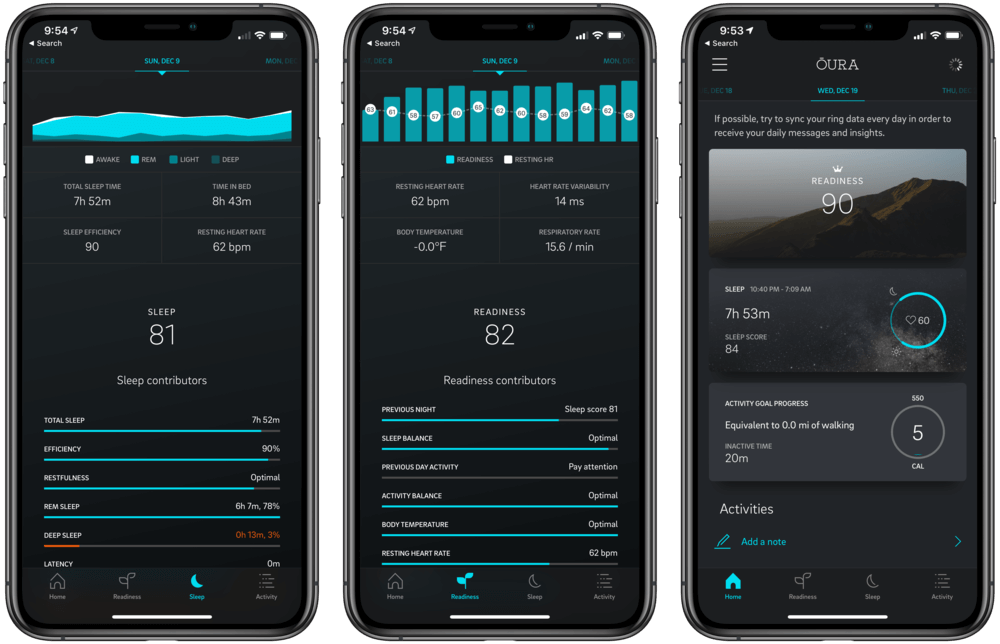
The Importance of Stress Resilience
We all experience stressful situations and difficulties. The question is how are you coping with them? Are you able to remain calm? Are you able to return to a relaxed state after the stressful event is over? Or are you stressing about one small event for the entire day or longer? Are you, perhaps, spinning in a constant stress-cycle and never able to feel relaxed, calm, and safe?
Stress resilience refers to your body’s ability and effectiveness in coping with stress and how quickly it can return to homeostasis or equilibrium after experiencing a stressor and stress response (9). Poor stress resilience feeds the cycle of chronic stress and increases your symptoms and risks of long-term consequences.
High stress resilience, however, can help you to get out of the cycle of chronic stress and return to a healthier, calm, and relaxed state. It can decrease your symptoms and reduce your risk of long-term consequences of chronic stress. High stress resilience can improve your physical, mental, emotional, and spiritual health and well-being.
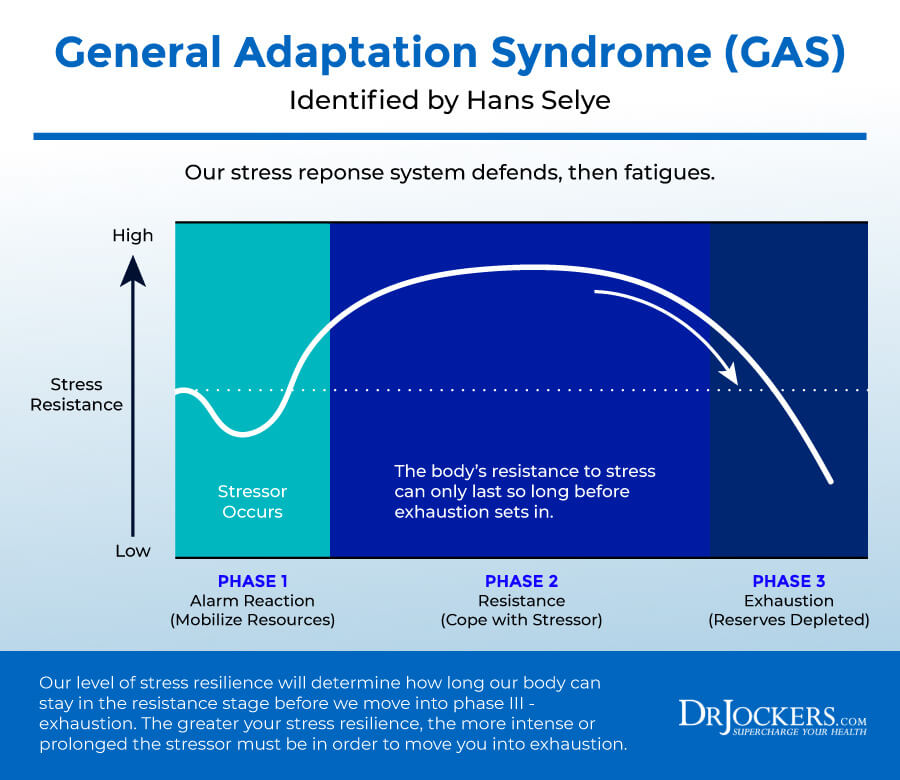
12 Strategies To Grow Stronger Through Stress
Let’s be real, our modern-day lives are full of stressors. No matter how low or how high your stress levels are, you can always improve your stress resilience.
Lowering your stress levels and improving your stress resilience is particularly important if you are experiencing high or chronic stress. Follow my 12 strategies to grow stronger through stress.
Practice Gratitude
There has been a lot of research on the benefits of a gratitude practice. According to a 2016 study published in Psychotherapy Research, gratitude can benefit stress, anxiety, and depression (10). The study involved 300 mostly college students and adults seeking mental health counseling on campus for depression or anxiety.
Participants were divided into three groups. One group had to write a letter of gratitude for three weeks. Another group had to write about their negative life experiences. The third control group had no tasks but was asked to carry on as normal. All groups received counseling. According to the study, the group that was asked to write gratitude letters reported significantly better mental health than the other groups even twelve weeks after the experiment.
As you can see, gratitude works and works long-term. However, as with all the tools I will be sharing here, consistency is the key. I recommend a regular gratitude practice. Upon waking, list at least three things you are grateful for. You can just think about it or write it down.
Stop throughout the day to notice and be grateful for the small things. You may set reminders on your watch for short moments of gratitude. In the evening, write down three things that you are grateful for that specific day. Try to think about three new things each day to train your brain to notice more goodness around you.
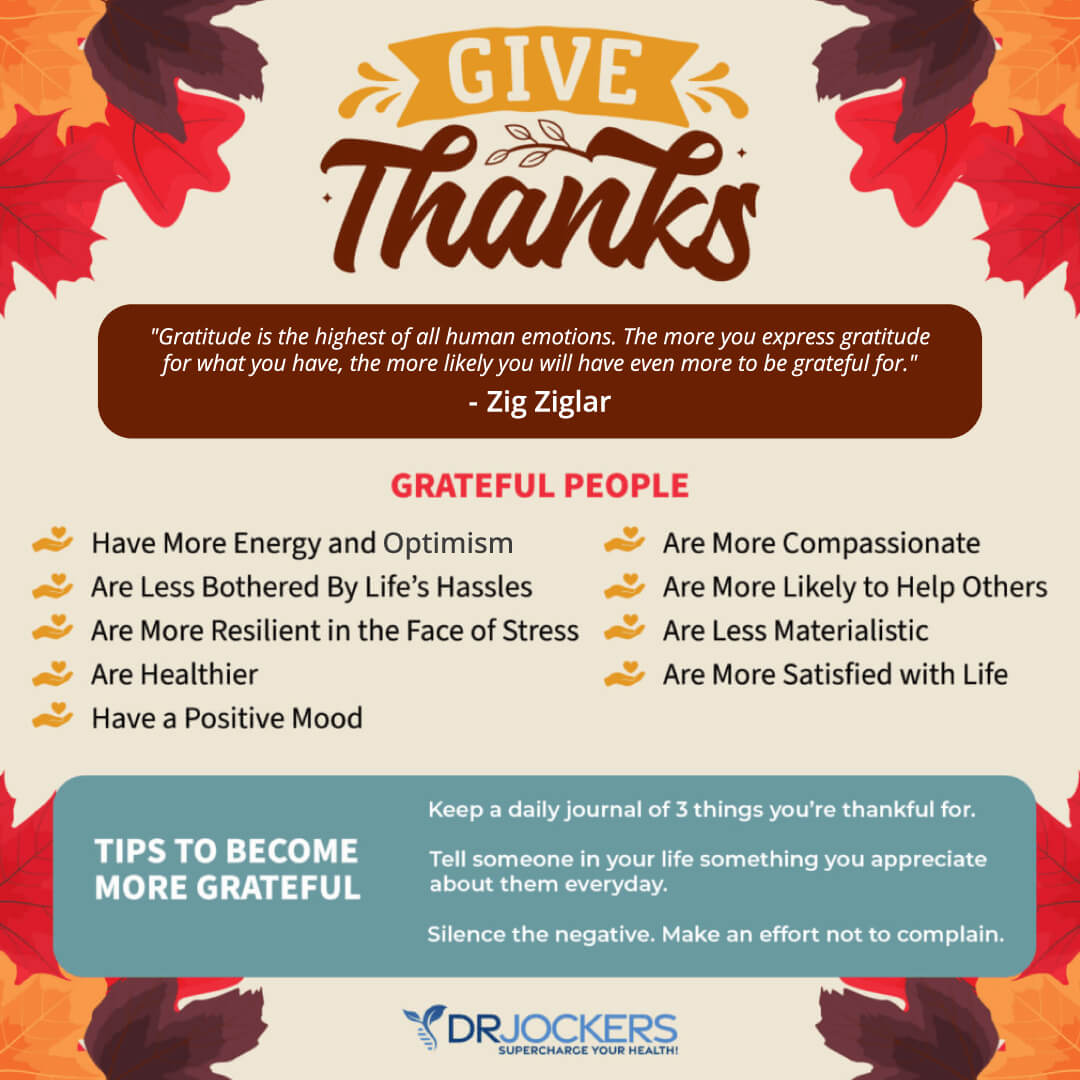
Find Reasons to Laugh
According to a 2009 paper in the Canadian Family Physician, laughter and humor for their complementary and alternative medical benefits (11). It can help to reduce stress, lower pain levels, and aid healing. It uplifts your mood.
While laughter increases your heart rate, respiratory rate, respiratory depth, and oxygen consumption, it also allows your body to move back to homeostasis by allowing muscle relaxation, decreasing heart rate, respiratory rate, and blood pressure after the episode of laughter. Laughter has no side effects or negative effects, only benefits.
These results are likely not surprising. We all feel better after a good laugh. Seek friends that you can laugh with. Laugh with your family. Learn from your kids, they find joy all day long and laugh all the time. Seek out funny movies or games that make you laugh. Seek humor even in difficult situations. Try laughter yoga and practice it regularly.

Deep Breathing, Prayer, and Meditation
According to a 2018 review in Frontiers of Medical Neuroscience, slow breathing techniques have a positive psychophysiological impact (12). According to 2017 research published in Frontiers of Psychology on the benefits of 8 weeks of deep breathing, breathwork can low your cortisol levels and improve your mental health (13).
A 2013 meta-analysis published in Frontiers of Psychology and a 2018 systematic review and meta-analysis published in the Clinical Psychology Review, mindfulness-based therapy which involves meditation, can lower stress, anxiety, depression, pain, addiction, and smoking (14, 15). Furthermore, according to an article on PsychCentral, spirituality, and prayer may relieve stress (16).
I recommend that you incorporate all these practices into your life. Learn more about the benefits of breathing from this article and incorporate at least one session of breathwork each day. Practice deep breathing when feeling stressed to calm your body and mind.
Pray regularly or engage in other spiritual practices that resonate with you. Find 5 to 15 minutes each day to meditate. There are some fantastic meditation apps and other free guided meditations online to help you get started.
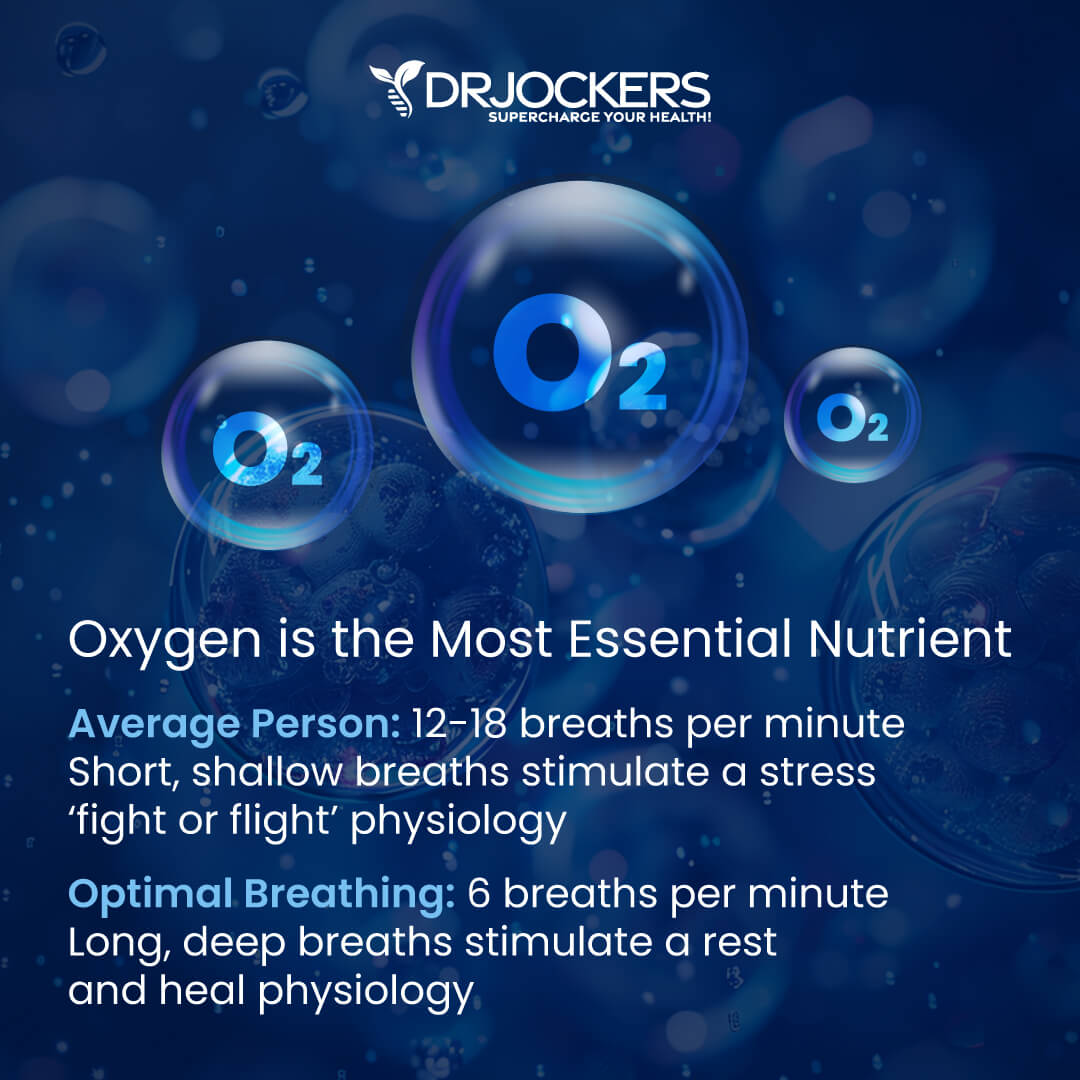
Blood Sugar Stabilizing Nutrition Plan
A 2012 study in Neurology, the Journal of the American Academy of Neurology, has shown that having high blood sugar can negatively impact your hippocampus and amygdala and impair your brain health (17). Your amygdala plays an enormous role in your fight-or-flight stress response. Moreover, high blood sugar levels increase your risk of prediabetes, diabetes, inflammation, and disease, and generally, negatively affect your entire body as well.
I recommend that you follow a blood sugar stabilizing nutrition plan that can help to improve your brainwaves and brain health. Eliminate sugar and refined carbs from your diet. Remove processed foods, artificial ingredients, refined ingredients, and inflammatory foods. Eat a diet low in carbohydrates, and get your carbs from healthy sources, such as low glycemic index fruits, such as berries.
Focus on greens, vegetables, herbs, spices, healthy fats, and clean protein. Keep regular mealtimes. Eat balanced, high-fat, moderate-protein, low-carbohydrate, and high-nutrition meals. To learn more about the low-carb ketogenic diet I recommend, read this article.
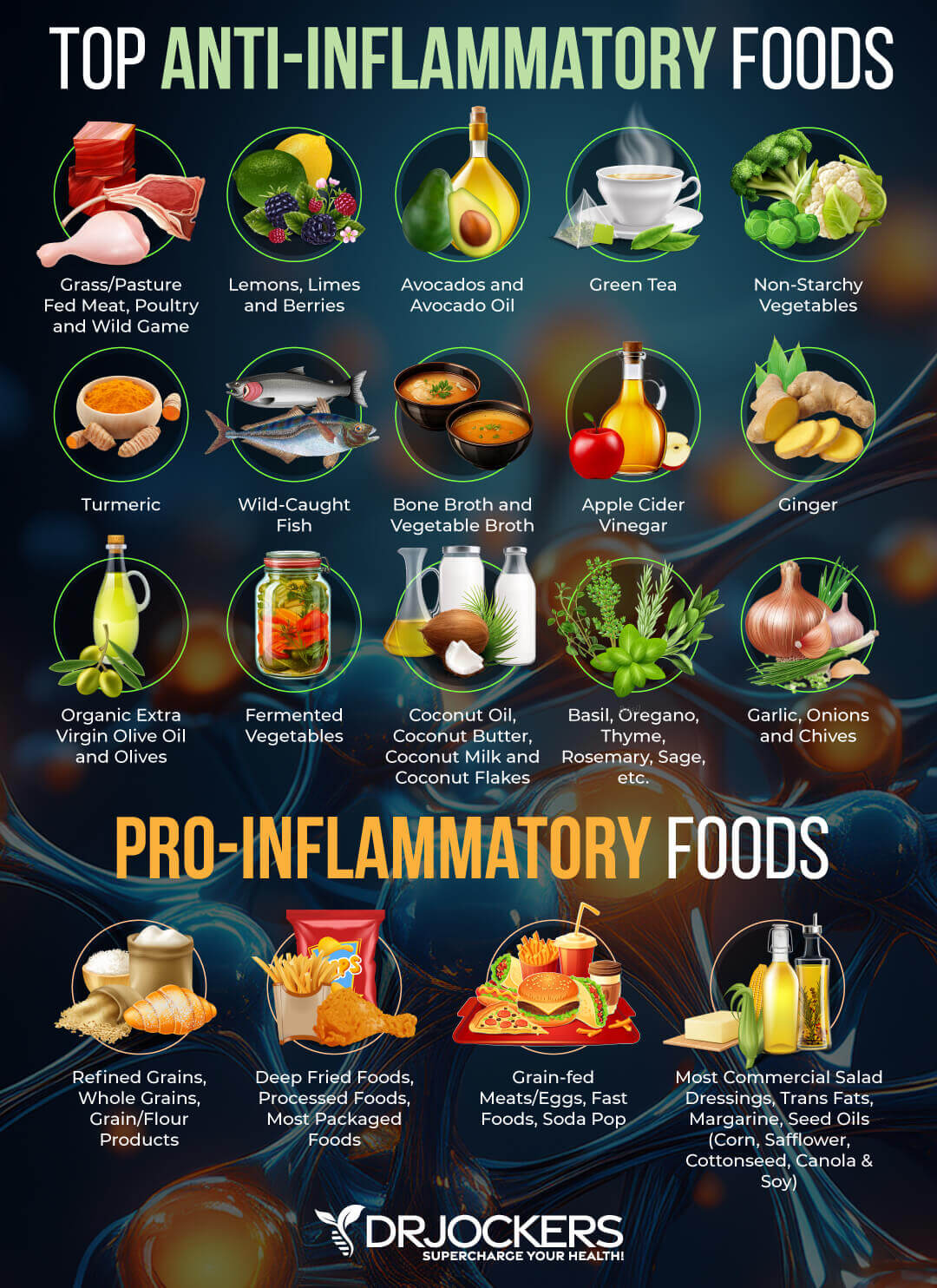
Regular Movement and Exercise
According to the Anxiety and Depression Association of America, regular exercise is important for reducing stress and improving your mental health (19). A 2014 study published in Frontiers of Physiology has found that regular exercise increases emotional resiliency under stress (20).
According to a 2015 study published in Sports Medicine, exercise can help to mitigate stress (21). Regular movement and exercise lower your stress levels, boost your mood, and decrease anxiety.
Start your day with a short stretch or yoga routine, rebounding, and maybe a short in your neighborhood. Move throughout the day by strolling down the park during lunch, taking the stairs, stretching regularly, gardening, doing housework or home improvement projects, walking your dog, and playing with your kids.
Exercise for 20 to 30 minutes at least five times a week practicing a combination of cardio, such as swimming, biking, dancing, or running, strength- and resistance training, such as weight training, bodyweight workouts, or kettlebell workouts, and low-impact exercises, such as yoga, Pilates, or Barre workouts. High-intensity interval training (HIIT) and Tabata workouts are a great mix of cardio and strength training.
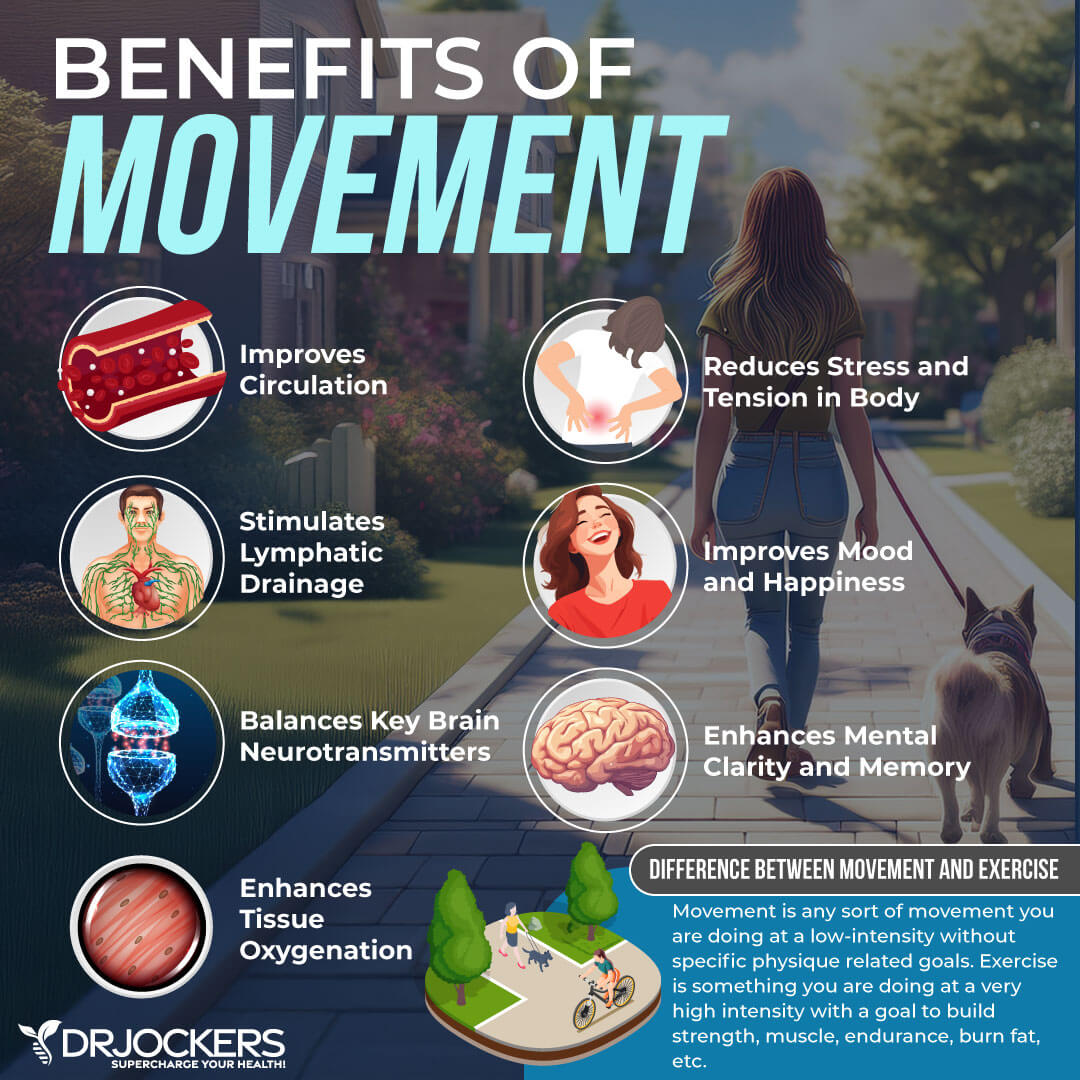
Prioritize Good Sleep
According to the American Psychological Association, adults who sleep less than 8 hours report higher stress levels than those who sleep less than that (21). According to a 2018 research published in the International Journal of Environmental Research and Public Health, workers who slept five hours or less had higher stress awareness than those who slept more. Sleep helps to lower your stress and support relaxation and repair (22).
I recommend that you get 7 to 9 hours of quality sleep each night. Make sure to go to bed and wake up around the same time every day. Avoid electronics, food, caffeine, and stress in the evening. Develop a bedtime routine that relaxes and calms you.
Try relaxing activities, such as meditation, prayer, stretching, journaling, and gratitude. Sip on a cup of herbal tea or golden milk. Create is a peaceful sanctuary in your bedroom with a comfortable bed, bedding, pillows, a salt lamp, some candles or essential oils, and your favorite spiritual books.

Improve Magnesium Levels
According to a 2011 research in Magnesium in the Central Nervous System, there is a link between magnesium and depression (23). Low magnesium levels are associated with depression while improving your magnesium levels can improve depression as well. According to a 2010 systematic review published in the Nutrition Journal, magnesium may be a complementary treatment for anxiety (24). Magnesium can promote muscle relaxation, feelings of calmness, lower stress, and better mental health.
Eat plenty of magnesium-rich foods including almonds, spinach, avocadoes, bananas, kale, pumpkin seeds, sunflower seeds, and cashews. Try regular Epsom salt baths to relax your body, calm your mind, and improve your magnesium levels. To ensure that your magnesium levels are optimal, I recommend Brain Calm Magnesium to improve your stress levels, energy, mood, and mental health.
Use Adaptogenic Herbs
According to a 2009 study published in Pharmaceuticals, adaptogenic herbs offer wonderful benefits for lower stress levels, relaxation, lower fatigue, and better mental health (25). When you are under stress, your adrenals release cortisol. However, under chronic stress, your body will be constantly releasing cortisol leading to problems. Adaptogens can help to reduce cortisol and lower your stress response.
One of the best adaptogenic herbs for stress resilience is ashwagandha. According to a 2012 study published in the Indian Journal of Psychological Medicine, ashwagandha is beneficial for reducing stress and anxiety (26). I recommend taking Cortisol Defense, a great supplement for stress resilience powered by ashwagandha, relora, L-theanine, banaba leaf extract, and maral extract. Take one capsule twice a day or for an advanced dose, two capsules twice a day.
Encourage & Serve Others
According to a 2007 study published in Psychiatry, social support is important and beneficial for stress resilience. A 2013 study published in the American Journal of Public Health on 846 participants who experienced a stressful event found that those who gave back and helped others experienced lowered stress and mortality a year later than those who did not.
Be a positive person in the life of your friends and family. Support and encourage others. Give back and serve others. Sign up for volunteer opportunities. Use your skills to serve others. Use your words as a source of positivity and encouragement. Smile at strangers.
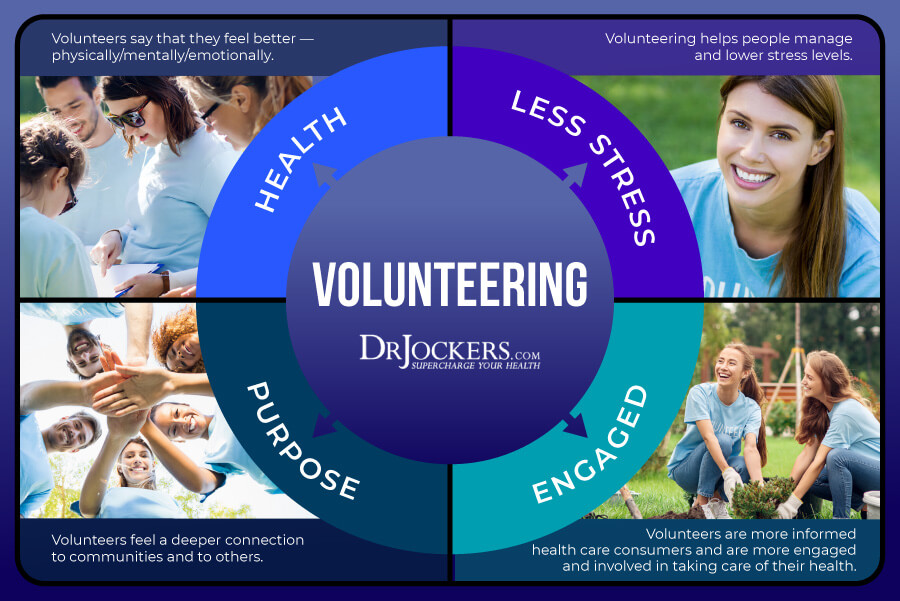
Listen to Classical, Worship, or Inspirational Music
According to a 2013 study published in PLoS One, music can impact the psychobiological stress system and the ANS (27). Music gets to you in the form of sound waves through your external ear, then ear canal funnels, and eardrum.
Arriving at your eardrum, these sound waves cause vibration that can lead to the release of chemical neurotransmitters, which may lead to decreased stress. According to a 2012 research at Duke Cancer Institute, listening to classical melodies reduced anxiety and pain during prostate biopsies (28). According to a 2004 study published in Clinical Trial, classical music may facilitate the reduction of blood pressure (29).
Listening to music can be very uplifting. It may ease stress, anxiety, and depression. However, it is important that you pay attention to what kind of music you are listening to. For positive effects, it needs to be uplifting. I recommend listening to classical music, worship, and inspirational music for stress resiliency. My family and I enjoy classical music and Christian worship daily.

Positive Visualization
Visualization is a form of meditation, and you’ve learned meditation can help to build stress resilience (14, 15). According to a 2018 study published in Frontiers Psychology, nature-based guided imagery can be beneficial for anxiety (30). Guided imagery or visualization can lower stress, anxiety, blood pressure, headaches, and pain.
I recommend that you practice positive visualization to improve your stress resilience. You may try a guided visualization. There are plenty to choose from on various apps, YouTube, meditation podcasts, and elsewhere online. You may also practice positive visualization on your own.
Close your eyes, take a few deep breaths, and visualize the mental or physical state you want to be in or the goal you want to achieve. Don’t just think it but feel, see, hear, and smell it through your imagination. Experience it as it is happening now and in real life.
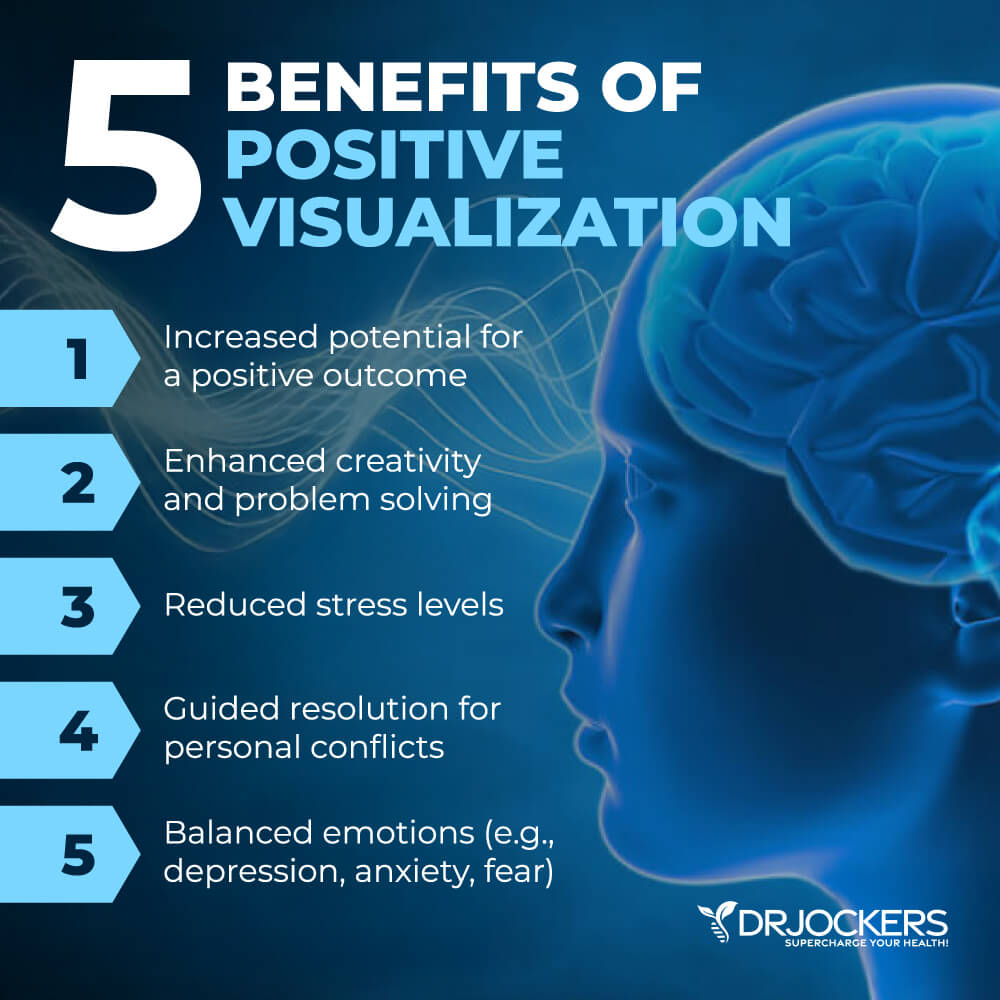
Use the Brain Tap System
The Brain Tap System is a revolutionary system that helps to restore your brain’s natural ability to balance. It helps to soothe your brain. It promotes relaxation and revitalization. This system supports you with a range of brain waves to achieve balance.
The Brain Tap System uses binaural beats, guided visualizations, a ten-cycle holographic music, and isochronic tones. It can help with reducing stress, lowering anxiety, experiencing better sleep, improving your ability to be in the moment, breaking unhealthy habits and creating healthier ones, creating a healthier body and life, restoring your body’s natural ability to maintain a healthy weight, and supporting the learning ability of children.
I have found that the Brain Tap system is a quick, easy, and effective way to lower stress, feel more calm and more controlled, improve cognition, experience more energy, and positivity, and feel overall healthier. Only 10 to 20 minutes a day can make an enormous difference in your brain, mental, emotional, and physical health.
Final Thoughts
Chronic stress can impact your entire body, including your respiratory, digestive, cardiovascular, musculoskeletal, nervous, reproductive, and endocrine systems, and affect your relationships, social life, professional life, financial health, and overall joy. Follow my strategies for stress resilience to grow stronger through stress and improve your mental, emotional, physical, and spiritual health.
If you want to work with a functional health coach, I recommend this article with tips on how to find a great coach. On our website, we offer long-distance functional health coaching programs. For further support with your health goals, just reach out—our fantastic coaches are here to support your journey.
Inflammation Crushing Ebundle
The Inflammation Crushing Ebundle is designed to help you improve your brain, liver, immune system and discover the healing strategies, foods and recipes to burn fat, reduce inflammation and Thrive in Life!
As a doctor of natural medicine, I have spent the past 20 years studying the best healing strategies and worked with hundreds of coaching clients, helping them overcome chronic health conditions and optimize their overall health.
In our Inflammation Crushing Ebundle, I have put together my very best strategies to reduce inflammation and optimize your healing potential. Take a look at what you will get inside these valuable guides below!







